新概念英语第一册73课lesson73thewaytokingstreet
新概念英语73课讲义

Lesson 73 the way to King Street一、单词与短语week: n. 周;weekend:周末;London: n.伦敦;in London:在伦敦;Suddenly:adv.突然地;补充:all of a sudden=suddenly:突然地;bus stop:公共汽车站;补充:railway station:火车站;airport:飞机场;smile: v.微笑;wear smile:面带微笑;pleasantly:adv.愉快地;补充:have a pleasant time:玩得高兴;understand:v.懂,明白;补充:make oneself understood: 让别人了解自己;Speak:v.讲,说;speak后边常跟具体的语言,如说汉语:speak Chinese;说英语:speak English;hand: n.手;补充:raise your hand:举手;wave your hand:挥手;pocket:n.衣袋;phrase:n.短语;slowly: adv.缓慢地;二、短语、句型及语法1、She does not know London very well, and she lost her way.他对伦敦不很熟悉,因此迷了路;在本句中有两个知识点需要引起注意:①know、、、well:对、、、了解,例:I know him very well.我非常了解他;I do not know the book very well.我对这本书不是很了解。
②关于与way相关的几个重要短语:lose one′s way: 迷路;I lost my way yesterday:昨天我迷路了;on the way to、、、在去、、、的路上;例:Tom is on the way to school now.汤姆现在正在去学校的路上。
by the way:顺便提一下,顺便问一下,例:By the way, I have something to tell you.我顺便有些事情想告诉你。
新概念第一册词汇语法第73课:ThewaytoKingStreet.docx
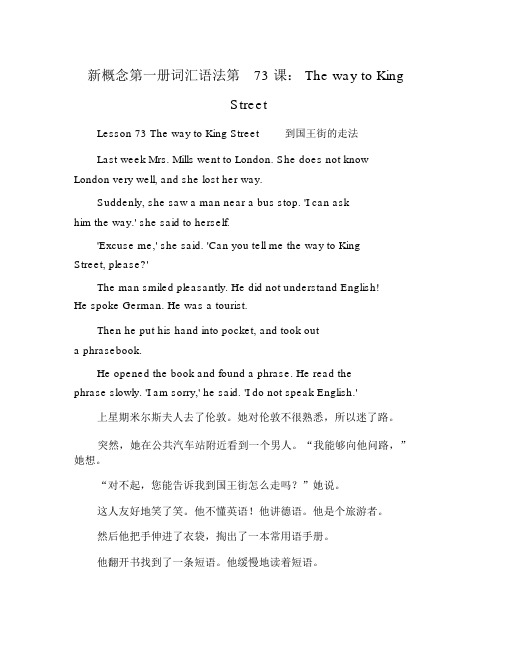
新概念第一册词汇语法第73 课: The way to KingStreetLesson 73 The way to King Street到国王街的走法Last week Mrs. Mills went to London. She does not know London very well, and she lost her way.Suddenly, she saw a man near a bus stop. 'I can askhim the way.' she said to herself.'Excuse me,' she said. 'Can you tell me the way to King Street, please?'The man smiled pleasantly. He did not understand English!He spoke German. He was a tourist.Then he put his hand into pocket, and took outa phrasebook.He opened the book and found a phrase. He read thephrase slowly. 'I am sorry,' he said. 'I do not speak English.'上星期米尔斯夫人去了伦敦。
她对伦敦不很熟悉,所以迷了路。
突然,她在公共汽车站附近看到一个男人。
“我能够向他问路,”她想。
“对不起,您能告诉我到国王街怎么走吗?”她说。
这人友好地笑了笑。
他不懂英语!他讲德语。
他是个旅游者。
然后他把手伸进了衣袋,掏出了一本常用语手册。
他翻开书找到了一条短语。
他缓慢地读着短语。
”很抱歉,“他,”我不会英。
” 1.She does not know London very well. 她敦不很熟悉。
新概念英语第一册第73课
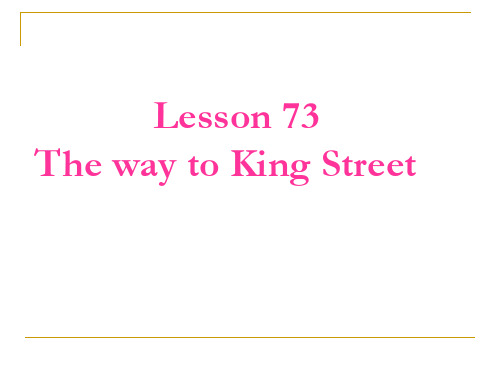
homework
1.听录音并跟读, 2.每个单词5遍,包括不规则动词
课文准备默写 3. 课课练
动词的过去式总结
一般来说,规则动词 v+ ed played, watched 等 以e结尾的动词, 直接+d telephoned, smiled, arrived 等 不规则动词 find-found, see-saw, speak-spoke, put-put
等 需要记忆
phrasebook /freɪz/ 短语手册
pocketˈ /pɒkɪt/ 口袋
speak /spiːk/ 说
watch the video and answer these questions.
Where did Mrs. Mill go last week? Why did the man need a phrasebook? What’s the man’s job(工作)? role playing
listen to the tape again
Last week Mrs. Mills went to London. She does not know London very well, and she lost her way.
Suddenly, she saw a man near a bus stop. 'I can ask him the way.' she sai way to King Street
Do you know the way to King Street?
Last week, Mrs. Mills wanted to go to King street, she didn’t know the way, either. Let’s see what happened?
新概念英语第一册第73-74课:The way to King Street
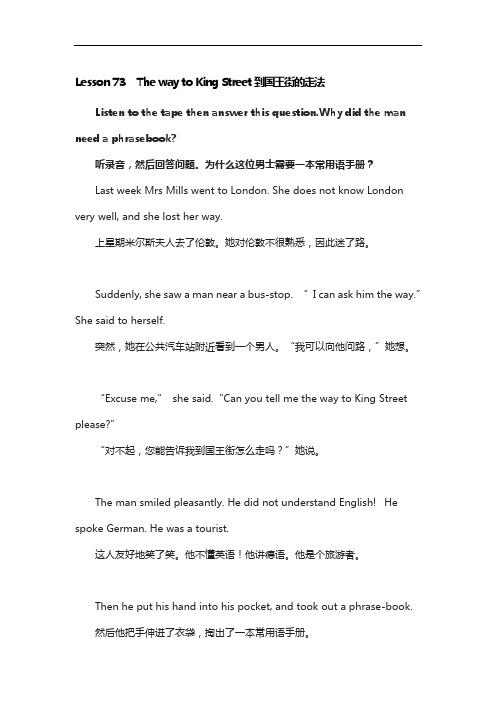
Lesson 73 The way to King Street到国王街的走法Listen to the tape then answer this question.Why did the man need a phrasebook?听录音,然后回答问题。
为什么这位男士需要一本常用语手册?Last week Mrs Mills went to London. She does not know London very well, and she lost her way.上星期米尔斯夫人去了伦敦。
她对伦敦不很熟悉,因此迷了路。
Suddenly, she saw a man near a bus-stop. “I can ask him the way.”She said to herself.突然,她在公共汽车站附近看到一个男人。
“我可以向他问路,”她想。
“Excuse me,”she said.“Can you tell me the way to King Street please?”“对不起,您能告诉我到国王街怎么走吗?”她说。
The man smiled pleasantly. He did not understand English! He spoke German. He was a tourist.这人友好地笑了笑。
他不懂英语!他讲德语。
他是个旅游者。
Then he put his hand into his pocket, and took out a phrase-book.然后他把手伸进了衣袋,掏出了一本常用语手册。
He opened the book and found a phrase. He read the phrase slowly. 他翻开书找到了一条短语。
他缓慢地读着短语。
“I am sorry,”he said. “I do not speak English.””很抱歉,“他说,”我不会讲英语。
新概念英语第一册73课lesson73thewaytoking

The composition of coordinate sentences
Each clause in a coordinate sentence has its own subject and verb, and the clauses are of equal grammatical importance.
The subject of a simple sentence can be a noun or pronoun, and the predicate includes the verb and any complements or
adjuncts.
Simple sentences can be declarative, interrogative, or imperative in form.
Sentence Analysis
• "We set off on our hike with high spirits, excited about the adventure ahead." - This sentence sets the scene for the story and introduces the main characters - a group of friends excited about their upcoming adventure. It also suggests that they are in a positive mood and ready to face any challenges that may come their way.
新概念第一册73课
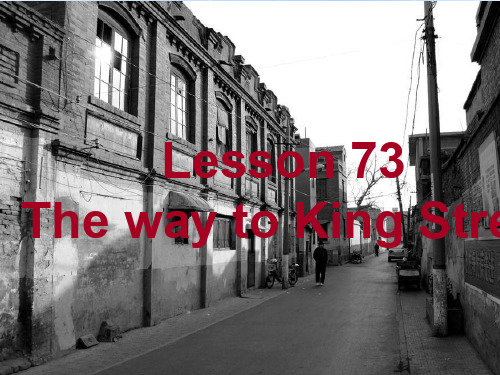
★ smile warm smile on her face.
look, she is smiling at me
★smile at sb.对着某人微笑
• Listen to the tape, then answer this question.
• Why did the man need a phrasebook?
课文讲解
• 1. Last week上周,这个短语奠定了本课是 过去时的基础。 这周 this week,下周 next week
front door.
• ls _w_a_s_(is) in London last week.
• 6.She _w__e_n_t _(go) to Paris last year .
• 7.The mand_r_a_n_k_(drink) their tea very
quickly.
• give sb. a hand 帮助某人 • on the one hand 一方面 • on the other hand 另一方面 • hand in hand 手拉手 • hand in 上交,交付 • hand over to移交给
★lose v. (lost—lost) v.使)迷路迷;(失
Lesson 73 The way to King Stre
规则:将下列给出的单词字母进行重新组合, 得出另外一些单词,看谁说得多!
woman answer father honest
• week
n. 周
• London
n. 伦敦
• suddenly
新概念英语第一册第73-74课听力:The way to King Street
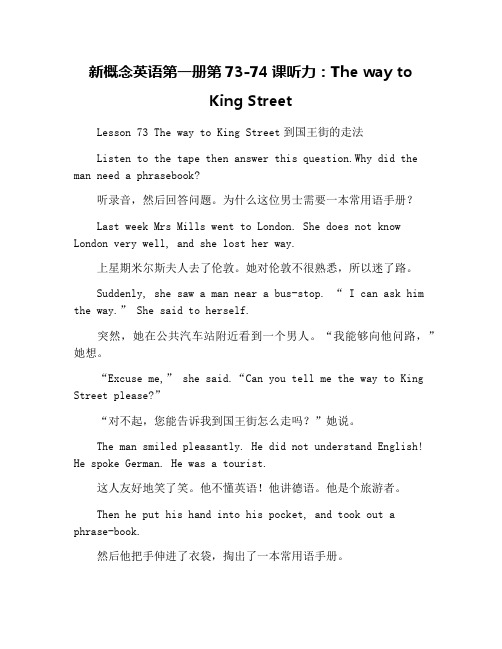
新概念英语第一册第73-74课听力:The way toKing StreetLesson 73 The way to King Street到国王街的走法Listen to the tape then answer this question.Why did the man need a phrasebook?听录音,然后回答问题。
为什么这位男士需要一本常用语手册?Last week Mrs Mills went to London. She does not know London very well, and she lost her way.上星期米尔斯夫人去了伦敦。
她对伦敦不很熟悉,所以迷了路。
Suddenly, she saw a man near a bus-stop. “ I can ask him the way.” She said to herself.突然,她在公共汽车站附近看到一个男人。
“我能够向他问路,”她想。
“Excuse me,” she said.“Can you tell me the way to King Street please?”“对不起,您能告诉我到国王街怎么走吗?”她说。
The man smiled pleasantly. He did not understand English! He spoke German. He was a tourist.这人友好地笑了笑。
他不懂英语!他讲德语。
他是个旅游者。
Then he put his hand into his pocket, and took out a phrase-book.然后他把手伸进了衣袋,掏出了一本常用语手册。
He opened the book and found a phrase. He read the phrase slowly.他翻开书找到了一条短语。
他缓慢地读着短语。
“I am sorry,” he said. “ I do not speak English.””很抱歉,“他说,”我不会讲英语。
新概念英语第一册73-74—The way to King Street
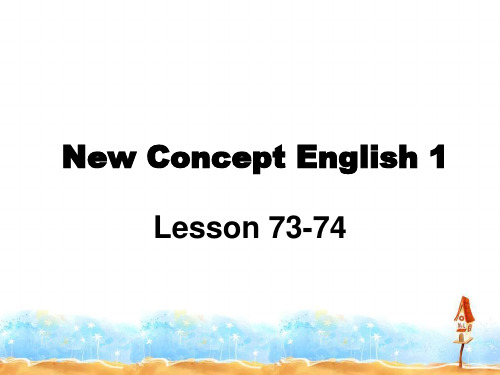
3.某些以辅音字母加不发音的字母e结尾 和以-ue结尾的形容词要先去掉e,然后再
加-ly。
如:
terrible terribly
true
truly
Grammar
• 需注意: friendly; motherly; lovely等词是形 容词而非副词。
• 在英语中,有些词既可以作形容词,又可以作 副词,如early, much, fast, little, wide, loud等。 由于这类词词性虽不同,但词形却一样,这就 需要大家学会在特定语境中判断它们各自 的词性。
quiet-quietly ; pleasant-pleasantly
Grammar
形容词变副词的规则:
2. 以辅音字母加y结尾的形容词要变y为 i,然后再加-ly。
如:
busy
busily
angry angrily
easy
easily
happy happily
Grammar
形容词变副词的规则:
can hear what he said. (adv.)
• 另外,还有一类副词和形容词词义相同,但拼写却 不同,如well和good。
• He speaks good(adj) English. 。 • He speaks English well(adv). 。 • hard---hard late-late good----well
Passage
ask the way 问路 ask sb. sth. 问某人某事。ask sb for sth向某人要某物 say-said say to oneself 心中暗想(不出声地) 反身代词: myself, yourself, himself, herself, itself,ourselves, yourselves, themselves
新概念英语第一册第73课精编版
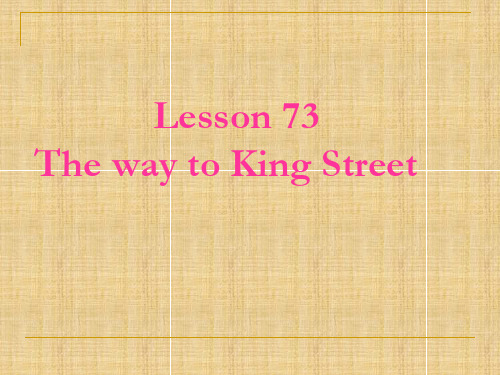
well.
lose one’s way 迷路(丢失了某人的路)。 lose my way, lose our way lose-lost. 这里的and相当于so。不翻成和
动词的过去式总结
一般来说,规则动词 v+ ed played, watched 等 以e结尾的动词, 直接+d telephoned, smiled, arrived 等 不规则动词 find-found, see-saw, speak-spoke, put-put
等 需要记忆
suddenly 既可以放在句首,也可以放在句中或 句末。 see-saw see看见,near 在附近。 near our school
ask sb. sth. 问某人某事。ask-asked 例句:He asked the teacher a question. say-said say to oneself 心中暗想myself,
Where is ......? the way to… 去...的路 这里的pleasantly是个副词(adv),修饰动作
smile。smile-smiled
He did not understand English. 改成肯定句
He understood English. did 是助动词 do/does 的过去式。 He spoke German. 改成 否定句,一般疑问
yourself, himself, herself, itself, ourselves, yourselves, themselves
新概念第一册Lesson 73-74课 The way to King Street
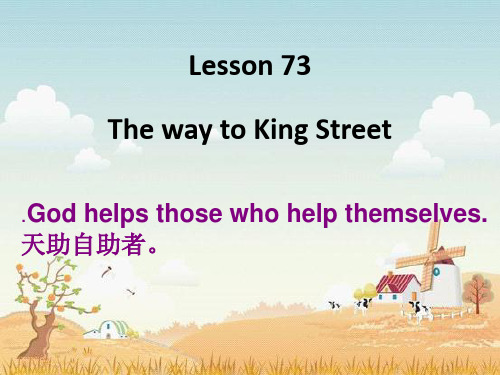
• 3.ask sb. sth. 问某人某事。 • eg:He asked the teacth向某人要某物 • ask for it=ask for trouble自找麻烦
• say-said-said • say to oneself 心中暗想(不出声地) • talk to oneself / think aloud 自言自语(小
It is pleasant today. 给人好感的人
a pleasant person
She smiled a pleasant smile.
=She smiled pleasantly.
★understand (understood) ① v. 理解;懂 我不明白你的意思
v. 懂,明白
I don’t understand what you mean.
• 在我小时,妈妈晚上常给我讲故事。
Exercises: 用speak, say, talk, tell正确 形式填空。
• “How silly of me!” hesaid to himself. • Do you speakChinese? • Look! Our teacher is talking with our parents. • He will tell the good news to everyone in our
• lose one’s way 迷路 • Lose sight of 看不见 • Lose heart失去信心,泄气 • Lost weight减肥 • Lost oneself in沉迷于,迷恋于,专心于 • Be lost in 迷恋于,专心于
Fill in the blanks
• Suddenly, she a man a bus-shop. “ I
新概念第一册73课
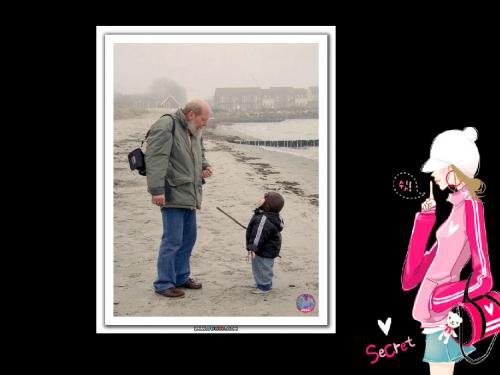
Lesson 73 The way to King Street. Lesson 74 What did they do?
Because he didn’t understand English.
Unit 37
( 7 )understand ( 8 )speak ( 11)phrasebook ( 12)phrase ( 13)slowly ( 9 )hand( 1 )week ( 2 )London( 5 )smiled ( 6 )pleasantly ( 10)pocket ( 3 )suddenly ( 4 )bus stop
suddenly adv.突然地
sudden adj. 突然的,意外的 all of a sudden 突然,冷不防
Suddenly, she saw a man near a bus stop. 突然,她在公共汽车站附近看到一个男人。
smile [smail]微笑
laugh
laugh at
• 形容词来修饰名词
• • • •
I work hard. You sing well. Jane drives carefully. Kevin runs fast.
• 副词来修饰动词
He read the phrase slowly.
He cut himself badly.
Listen and speak English !
找找文中出现的副词,你认识吗?
• • • • well suddenly pleasantly slowly
形容词与副词的变化方式包括以下三类: 形容词词尾加ly 成为副词 1.quiet--- quietly slow--- slowly beautiful---beautifully 2. 形容词与副词同形 例如:fast--- fast hard--- hard 3. 形容词与副词完全不同 例如:good--- well
概念英语第一册第73-74课-The way to King Street
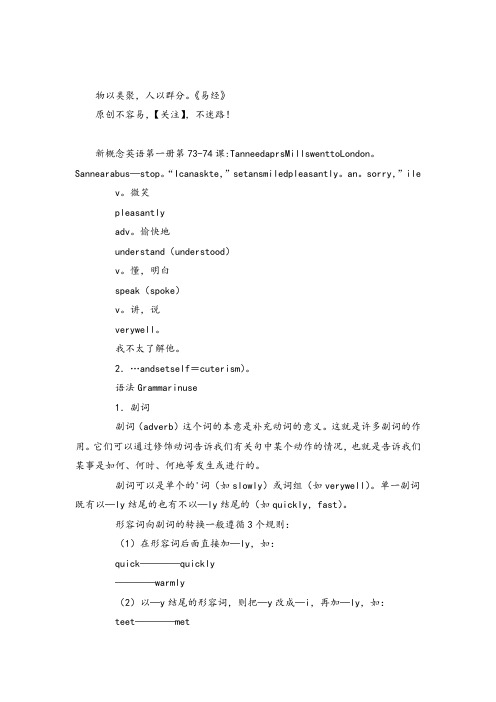
物以类聚,人以群分。
《易经》原创不容易,【关注】,不迷路!新概念英语第一册第73-74课:TanneedaprsMillswenttoLondon。
Sannearabus—stop。
“Icanaskte,”setansmiledpleasantly。
an。
sorry,”ile v。
微笑pleasantlyadv。
愉快地understand(understood)v。
懂,明白speak(spoke)v。
讲,说verywell。
我不太了解他。
2.…andsetself=cuterism)。
语法Grammarinuse1.副词副词(adverb)这个词的本意是补充动词的意义。
这就是许多副词的作用。
它们可以通过修饰动词告诉我们有关句中某个动作的情况,也就是告诉我们某事是如何、何时、何地等发生或进行的。
副词可以是单个的'词(如slowly)或词组(如verywell)。
单一副词既有以—ly结尾的也有不以—ly结尾的(如quickly,fast)。
形容词向副词的转换一般遵循3个规则:(1)在形容词后面直接加—ly,如:quick————quickly————warmly(2)以—y结尾的形容词,则把—y改成—i,再加—ly,如:teet————metcome————camelose————losttell————toldspeak————spokefind————foundgive————gaveswim————swamyykeyonmywaye。
我进不了自己的房子,因为在回家的路上我把钥匙丢了。
Welostean。
我不明白你的意思。
(2)明了;了解;得知:achineworksisstillnotfullyunderstood。
这台机器到底是如何运转的仍未被完全弄清楚。
OnlytodayhaveIbeguntounderstandthepoliticalsituationinNorthernIreland。
新概念英语第一册73课lesson73thewaytokingstreet
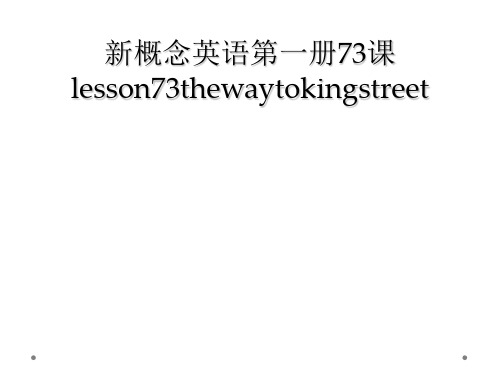
say to oneself 心中暗想 talk to oneself 自言自语 find - found read - read
语法-副词
副词 adverb -这个词的本意是补充动词的意 义。许多副词都是这个作用。它可以通过修 饰动词来告诉我们句子中的某个动作的情况 〔He runs fast.〕,也可以告诉我们某事是如 何/何时/何地等发生或进展的。 Suddenly, it rained. He lives in Dongsheng. I went to Kangbashi yesterday.
谢谢
slow adj. 缓慢的
know ...well 对。。了解 我不太了解他。
I don't know him very wel. and she lost her way. and - 所以
lost one's way 迷路 ask sb. the way 问路 如果你迷路了,你可以找人问路。
If you lost, you can ask someone the way.
speak
speak - spoke speak to sb. 我能讲三种语言。 I can speak three kinds of languages.
hand n.手
second hand 二手 我买了一辆二手车。 I bought a second hand car. give sb. a hand 帮助 你能帮助我吗? Can you give me a hand ?
pleasantly adv.愉快地 He smiled pleasantly. 他亲切的微笑。
pleasant adj.愉快的 The climate here is very pleasant.
新概念英语第一册第73课.ppt
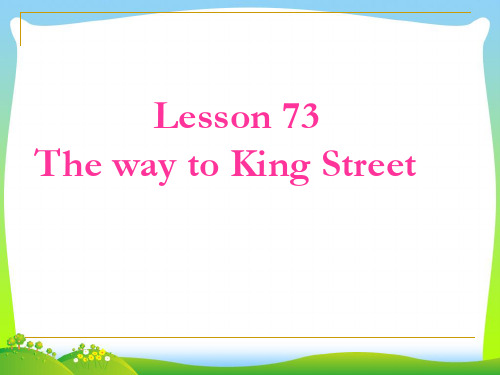
phrasebook /freɪz/ 短语手册
pocketˈ /pɒkɪt/ 口袋
speak /spiːk/ 说
watch the video and answer these questions.
Where did Mrs. Mill go last week? Why did the man need a phrasebook? What’s the man’s job(工作)? role playing
put-put, take-took put… into… 把…放进…中去 take.. out... 把... 拿出来。 slowly 副词(adv) 修饰动词 read , slow- slowly,以y结尾的, happy-happily
He read the book slow.
know-knew 例句:I know him very well. I don’t know the city very
well.
lose one’s way 迷路(丢失了某人的路)。 lose my way, lose our way lose-lost. 这里的and相当于so。不翻成和
suddenly 既可以放在句首,也可以放在句中或 句末。 see-saw see看见,near 在附近。 near our school
Did he speak German? spoke 变成了原形
speak-spoke speak:说某种语言speak English, German 同某人通电话speak to sb. tell:告诉、告知。tell sb. sth. say: 说话(一件事) say sth. / She said, ‘…’ She ___ me she was 18 years old. She said ‘ Thank you very much.’ She wanted to ___ to me.
Lesson73ThewaytoKingStreet(课件)新概念英语第一册

The way to King Street
London
Where was Mrs. Mills?
Last week Mrs. Mills went to London. She does not know London very well,and she lost her way.
yesterday afternoon 昨天下午
yesterday
evening 昨天晚上 last night昨天夜里
last month 上个月 last week 上周 last year 去年
The man
.
副词的用法: 副词主要用来修饰动词,形容词,副词或整个句子。 副词的位置:动词+副词;
The man smiled pleasantly. He did not understand English! He spoke German. He was a tourist.
Then he put his hand into pocket, and took out a phrasebook.
to London. ,and
Suddenly, she saw a man near a bus stop. 'I can ask him the way.' she said to herself. 'Excuse me,' she said. 'Can you tell me the way to King Street, please?'
Suddenly, she saw a man near a bus stop. 'I can ask him the way.' she said to herself.
新概念英语第一册Lesson73:ThewaytoKingStreet

★新概念英语频道为⼤家整理的新概念英语第⼀册Lesson 73:The way to King Street,供⼤家参考。
更多阅读请查看本站频道。
Last week Mrs Mills went to London. She does not know London very well, and she lost her way.Suddenly, she saw a man near a bus-stop. “ I can ask him the way.” She said to herself.“Excuse me,” she said.“Can you tell me the way to King Street please?”The man smiled pleasantly. He did not understand English! He spoke German. He was a tourist.Then he put his hand into his pocket, and took out a phrase-book.He opened the book and found a phrase. He read the phrase slowly.“I am sorry,” he said. “ I do not speak English.”New Word and expressions ⽣词与短语weekn. 周Londonn. 伦敦suddenlyadv. 突然地bus stop公共汽车站smilev. 微笑pleasantlyadv. 愉快地understand (understood)v. 懂,明⽩speak (spoke)v. 讲,说handn. ⼿pocketn. ⾐袋phrasebookn. 短语⼿册,常⽤语⼿册phrasen. 短语slowlyadv. 缓慢地本⽂参考译⽂上星期⽶尔斯夫⼈去了伦敦。
新概念英语第一册自学导读Lesson 73 The way to King Street
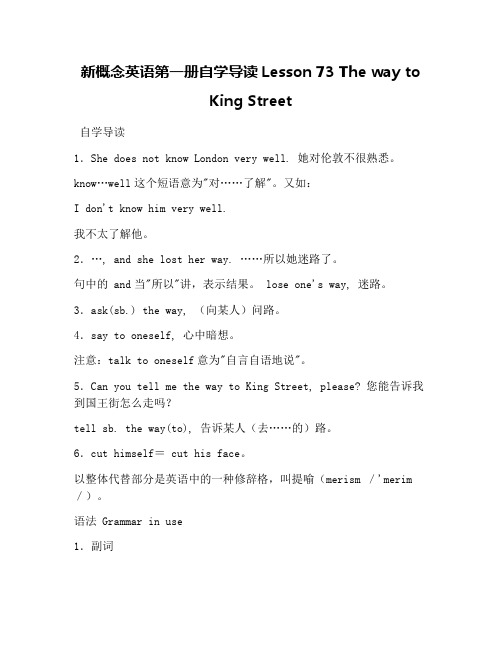
新概念英语第一册自学导读Lesson 73 The way toKing Street自学导读1.She does not know London very well. 她对伦敦不很熟悉。
know…well这个短语意为"对……了解"。
又如:I don't know him very well.我不太了解他。
2.…, and she lost her way. ……所以她迷路了。
句中的 and当"所以"讲,表示结果。
lose one's way, 迷路。
3.ask(sb.) the way, (向某人)问路。
4.say to oneself, 心中暗想。
注意:talk to oneself意为"自言自语地说"。
5.Can you tell me the way to King Street, please? 您能告诉我到国王街怎么走吗?tell sb. the way(to), 告诉某人(去……的)路。
6.cut himself= cut his face。
以整体代替部分是英语中的一种修辞格,叫提喻(merism /'merim /)。
语法 Grammar in use1.副词副词(adverb)这个词的本意是补充动词的意义。
这就是很多副词的作用。
它们能够通过修饰动词告诉我们相关句中某个动作的情况,也就是告诉我们某事是如何、何时、何地等发生或实行的。
副词能够是单个的词(如 slowly)或词组(如 very well)。
单一副词既有以-ly结尾的也有不以-ly结尾的(如 quickly, fast)。
形容词向副词的转换一般遵循3个规则:(1)在形容词后面直接加-ly,如:quick----quicklyhurried----hurriedlypleasant----pleasantlywarm----warmly(2)以-y结尾的形容词,则把-y改成-i,再加-ly,如:thirsty----thirstilyhappy----happily(3)形容词与副词形式相同:late----latefast----fasthard----hardwell----well2.部分不规则动词的过去式形式go----wentsee----sawunderstand----understood take----tookread----read /red/drink----drankrun----ranknow----knewsay----saidput----putcut----cuteat----atemeet----metcome----camelose----losttell----toldspeak----spokefind----foundgive----gaveswim----swamhave----had词汇学习 Word study 1.lose v.。
新概念一Lesson73 the way to King Street
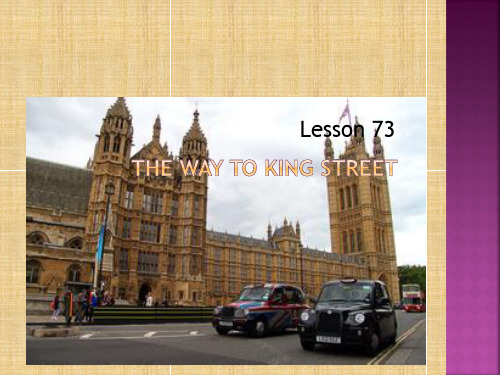
quickly
是 是 去 丢失 看见 说 明白
放 拿
找到
读
说
She
does not know London very well, and she lost her way. 1.know I.know…very well 对某地、某人、某物很了解 Eg. I know him very well. I know Haicheng very well. II. Do you know? I don’t know. 2.lose his way 他迷路了 lose her way 她迷路了 lose my way 我迷路了
hurried
-----hurriedly 匆忙地 pleasant---pleasantly 友好地 warm----warmly 温暖地 slow----slowly 慢地 quick----quickly 快地 sudden—suddenly 突然地 careful---carefully 小心地
How can I understand that you understand? Understand?
understand 不能用现 在进行时
speak [spi:k]
speak: speak English 说语言 speak to sb. about sth. 跟某人说 say : say sth. to sb. 对某人说(对话) tell: To tell you the truth 告诉 tell a story 诉说 Can you tell me something about your weekend? talk : Don’t talk in the class. 交谈,聊天 We are talking about our new teacher. The teacher is talking to the naughty student. Tom is talking with his friend Bob.
新概念一册Lesson 73 The way to King Street

★ smile n. &v. 笑 她从来不笑 She never smiles. 她脸上露出亲切的 微笑 She had a warm smile on her face. ★ pleasantly adv. 愉快地 pleasant adj. 愉快的,和蔼可亲的 今天的天气令人心情愉快 It is pleasant today. 给人好感的人 a pleasant person
伦敦塔是由威廉一世为镇压当地人和保卫伦敦 城,于一〇八七年开始动工兴建的,历时二 十年,堪称英国中世纪的经典城堡。 1204年約翰國王統治時期倫敦塔成為皇家動物 園,倫敦塔曾經成為牢獄之地以及軍事要塞 。
The 1914 Tower of London be shot11 German spy is located, and the final was held in the Tower of London is a British officer Norman Baillie-Stewart. In 1978Henry Laurence closed the only one American prisoners The Tower of London is no longer limited to the royal family, but still retains the royal residence, so there will be sentries here at.
• Elizabeth I ( released in 15551554, is the only escape from the guillotine in the prisoner of Tower of London ) Queen Anne Boleyn and The Countess of Margaret was executed here
- 1、下载文档前请自行甄别文档内容的完整性,平台不提供额外的编辑、内容补充、找答案等附加服务。
- 2、"仅部分预览"的文档,不可在线预览部分如存在完整性等问题,可反馈申请退款(可完整预览的文档不适用该条件!)。
- 3、如文档侵犯您的权益,请联系客服反馈,我们会尽快为您处理(人工客服工作时间:9:00-18:30)。
pleasantly adv.愉快地 He smiled pleasantly. 他亲切的微笑。 pleasant adj.愉快的 The climate here is very pleasant.
understand v.懂,明白
understand - understood (过去式) The book is hard to understand. 这本书很难懂。 I don't understand Italian. 我不懂意大利语。
suddenly adv.突然地
He suddenly came in. Suddenly, they screamed.突然,他们尖叫了
bus stop 公共汽车站
在公共汽车站 at the bus stop 我经常在公共汽车站看到他。 I often see him at the bus stop. 火车站 railway he railway station/ airport
say to oneself 心中暗想 talk to oneself 自言自语 find - found read - read
语法-副词
副词 adverb -这个词的本意是补充动词的意 义。许多副词都是这个作用。它可以通过修 饰动词来告诉我们句子中的某个动作的情况 (He runs fast.),也可以告诉我们某事是如 何/何时/何地等发生或进行的。 Suddenly, it rained. He lives in Dongsheng. I went to Kangbashi yesterday.
我们发现可以是一个词,也可是一个词组。 The old man is walking slowly. You did it very well. 形容词转换为副词一般遵循3个规则: quick - quickly , pleasant -pleasantly 1. 在形容词后直接加 -ly. happy -happily 2. 以 -y 结尾的, 把y 变为i 再加 -ly. late -late, fast -fast, hard -hard, well -well 3.形容词与副词形式相同。
slow adj. 缓慢的
know ...well 对。。了解 我不太了解他。 I don't know him very wel. and she lost her way. and - 所以 lost one's way 迷路 ask sb. the way 问路 如果你迷路了,你可以找人问路。 If you lost, you can ask someone the way.
smile v.微笑
smile - smell 发音区别 smile at sb. 对某人微笑 我对着孩子们微笑然后打了招呼。 I smiled at the children and said hello. n. 微笑 give sb. a smile 给某人一个微笑 laugh 大声笑 laugh at 嘲笑某人 Don't laugh at others.别嘲笑别人。
speak - spoke speak to sb. 我能讲三种语言。 I can speak three kinds of languages.
n.手
second hand 二手 我买了一辆二手车。 I bought a second hand car. give sb. a hand 帮助 你能帮助我吗? Can you give me a hand ?
. 衣袋
我找不到衣袋里的钥匙了。 I can't find the key in my pocket. pocket money 零花钱
slowly adv.缓慢地
Can you drive a little slowly ? 你能慢点开车吗? They are walking slowly along the street.
Lesson 73 The way to King Street
week n.周 There are seve days in a week, Monday, Tuesday, Wednesday, Thursday, Friday, Saturday and Sunday. weekday 工作日;上学日(星期一到星期五) on weekdays 在平日,在工作日 weekend 周末 at weekends 在周末 weekly adj. 每周的
